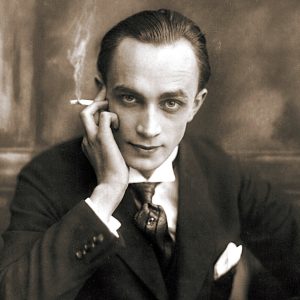
Conrad Veidt
By Mitch Hemann
Conrad Veidt is well known for his illustrious career on the silver screen, but the behind the scenes story of one of the silent era’s greatest villains is also deserving of the spotlight. The man was raging against the machine back when the machine was still being built.
Walter Hans Conrad Veidt was born on January 22, 1893 in Berlin, Germany. In 1914, he began his studies at the Deutches Theatre under the tutelage of well-known director Max Reinhardt. He was drafted that same year and sent to battle in WWI. During the war, Veidt fell ill and was discharged. He returned to the Deutches and, by 1917, he had completed four films and was married to his first wife, cabaret performer Augusta “Gussy” Hall.
In 1919, Veidt gained more notoriety by playing Frederic Chopin in Nocturne of Love, starring in Around the World in Eighty Days and, more notably, for his role in the controversial Different from the Others, in which Veidt plays a professional violinist who falls in love with a male student. It’s considered the first film to directly address homosexuality, which was illegal in Germany at the time. The film is groundbreaking in that it casts a positive light on the gay experience. In 1920, Veidt starred in Robert Weine’s The Cabinet of Dr. Caligari. It was a huge success and is widely known as one of the most influential films of the silent era.
With Caligari, Veidt became a star. At the same time, he was getting divorced. He married his second wife, Felicitas Radke, in 1923 and they had a daughter, Vera Viola Maria. His success continued in 1924 with The Hands of Orlac and Waxworks.
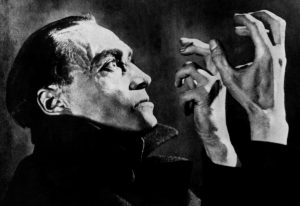
The Hands of Orlac, 1924
In 1927, Veidt went to Hollywood, playing King Louis XI in The Beloved Rogue. In 1928, he starred in The Man Who Laughs, playing a role that would inspire one of the most infamous characters in the Batman comics, The Joker.
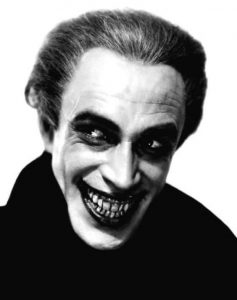
The Man Who Laughs, 1928
When talkies became the rage, Veidt’s thick accent sent him back to Germany and he soon found himself divorced again. He spent a great deal of time in England, working on his speech. He would eventually fall in love with a German Jew named Llona “Lily” Prager. They were married in 1933.
Veidt was an outspoken enemy of the Nazi party, which was gaining footing in Germany. For this reason, and out of concern for his new bride, they emigrated to the U.K. Before leaving Germany, Veidt wrote that he was “Jewish” on his race identity card. He was arrested by the Gestapo and there were orders to have him killed. However, thanks to his celebrity status, he was instead sent to England to avoid controversy. Once out of Germany, Veidt arranged to have his ex-wife and daughter transported to Switzerland.
Veidt’s career continued in England, appearing in films such as Dark Journeys and Contraband. In 1940, while working on the critically acclaimed The Thief of Bagdad, he found himself heading back to America, when air strikes on London forced the production to relocate to Hollywood. Veidt’s portrayal of the evil Vizier Jaffar once again had a major influence on the industry. This time it was Disney, who in 1992 used Veidt’s performance to create their own Jaffar in Aladdin.
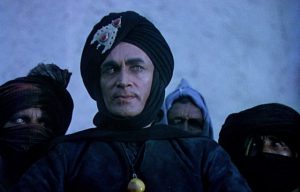
Thief of Bagdad, 1940
Conrad and Lily moved permanently to Hollywood. In 1942, Veidt found himself in two films in which he played Nazis. In Nazi Agent, he was double cast as identical twins. One brother was a Nazi spy and the other an expatriate. He then played a Nazi officer in Casablanca. Veidt’s Major Strasser is considered one of his greatest roles.
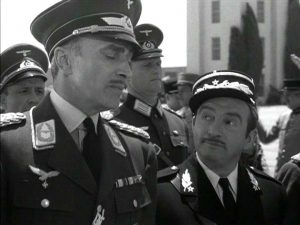
Casablanca, 1942
It’s surprising that a man who despised the Nazis as much as Veidt would be willing to play Nazis on film, but there was more to his decision than mere exploitation. Anticipating that he would be typecast as a Nazi, he made sure it was stipulated in his contract that he would only play them as villains. In fact, before heading to America, Veidt gave his life-savings to the British government to help fund the war effort, and he continued to send money to the Allied Forces while in the States. Conrad Veidt was to become one of the industry’s most unsung champions against the Third Reich.
Veidt died on April 3rd, 1943 of a heart attack in Los Angeles, but his legacy as the villain who was actually a hero will live on.


He had incredibly beautiful eyes and head shape. It didn’t matter that his
hairline was receded–his head and hair more than made up for that. He was
a wonderful actor. I loved hating him in “Casablaca,” and a later film again
playing a nasty Nazi with Norma Shearer. So sad he died so young.
big fan of this guy now i want to film also
Lovely article especially on the anniversary of his death. Thank you!
2021 big fan of this guy something about him i see a part of him in me some how .
big fan of this guy now i want to film also